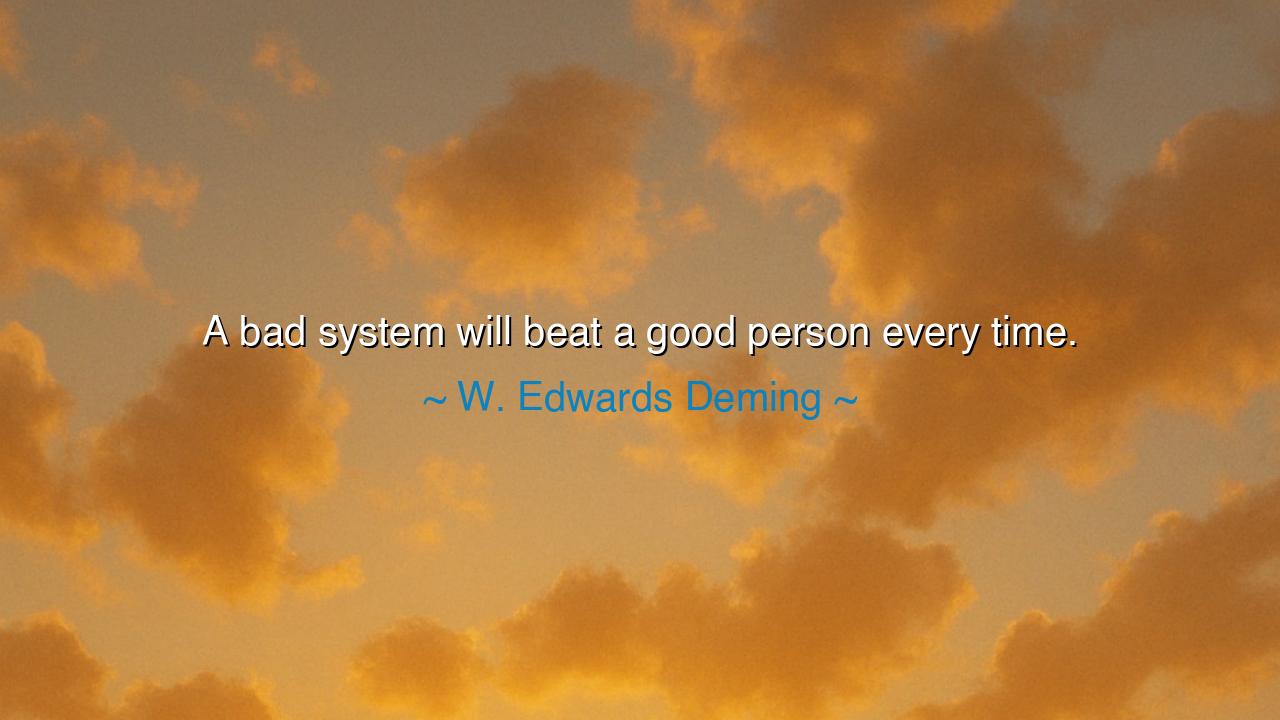
A bad system will beat a good person every time.






The words of W. Edwards Deming—“A bad system will beat a good person every time.”—carry the weight of bitter truth, forged in the fires of industry and human striving. Deming, the father of modern quality management, spoke not of abstractions but of realities: he saw how noble hearts and diligent hands could be crushed under the weight of structures poorly built. In this line lies the sorrow of the human condition—that virtue alone cannot always prevail when trapped in the machinery of corruption, inefficiency, or chaos.
The ancients themselves knew this well. Plato wrote of the just man placed in an unjust city, and how even his righteousness could be twisted, mocked, or destroyed if the laws and institutions around him were corrupt. The Spartans drilled not merely brave men but systems of discipline, knowing that courage alone, without order, could crumble against the organized might of the enemy. Thus, Deming’s warning echoes the wisdom of old: the system shapes the man more than the man shapes the system, unless the man is strong enough to transform it.
History gives us searing examples. Consider the fall of the Roman Republic. Men like Cicero and Cato sought to preserve honor, law, and virtue, but the system had already rotted with bribery, inequality, and ambition unchecked. Their goodness could not withstand the machinery of corruption, and so they fell before it, paving the way for tyranny. It was not their lack of character that doomed them, but the bad system that devoured even the most noble.
Yet we also see hope in those who recognized this truth and sought to build systems worthy of their people. George Washington, after the Revolution, could have crowned himself king. Instead, he worked with others to forge a Constitution that bound leaders to law. By shaping a system of checks and balances, he ensured that even flawed men could be guided by structure, rather than undone by it. His greatness lay not only in his personal virtue, but in his understanding that the system must uplift the many, not rely solely on the few.
Beloved listener, the meaning is plain: never deceive yourself into believing that good intentions alone will save you. The mightiest oak cannot flourish in poisoned soil. The noblest worker cannot thrive in a broken workplace. The kindest soul cannot heal in a family ruled by cruelty. Systems, whether of government, of business, or of community, will either nurture virtue or grind it into dust. To fight corruption, one must not only strive as an individual, but also labor to mend the structure that shapes all.
The lesson for us is both urgent and practical: wherever you live, wherever you labor, look not only to the goodness of individuals, but to the health of the system that surrounds them. If the rules, incentives, and culture are broken, even the finest person will be set up to fail. And if you are in a place of leadership, your greatest task is not only to inspire, but to build systems where good people can thrive without being crushed by the weight of dysfunction.
Practical wisdom demands this: question the systems around you. If they are unjust, do not merely blame individuals for failing to rise above them—seek instead to reform the structure. And in your own life, create systems of habit and discipline that protect you when your will is weak. For the ancients knew, and Deming reminds us, that the battle is not won by will alone, but by the ground upon which the battle is fought.
So let Deming’s words remain with us as both warning and call: “A bad system will beat a good person every time.” Let them drive us not to despair, but to vigilance and courage. For if systems can destroy the virtuous, then systems, rebuilt with wisdom and justice, can preserve and multiply virtue. The task of each generation is not only to raise good people, but to forge good systems, so that both together may endure against the weight of time.






AAdministratorAdministrator
Welcome, honored guests. Please leave a comment, we will respond soon